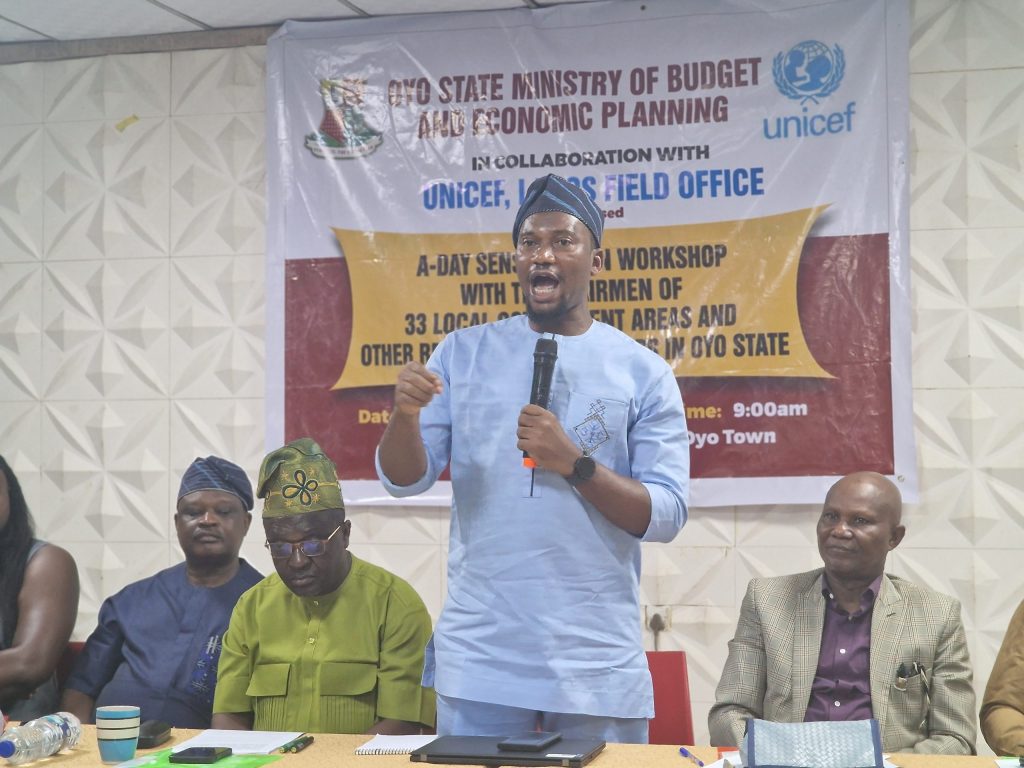Chairmen of all 33 Local Government Areas in Oyo State have vowed to prioritize child rights in their governance and budgeting processes following a damning report by the United Nations Children’s Fund (UNICEF), which revealed chronic underfunding of child welfare services in the state.
The pledge was made at the end of a high-level dialogue meeting held on Wednesday, June 26, 2025, at Plaza De Aruna Hotel, Oyo, jointly organized by UNICEF, the Oyo State Ministry of Budget and Economic Planning, and the Ministry of Local Government and Chieftaincy Matters.
In a jointly signed communiqué, the council chairmen admitted that current levels of deprivation affecting children in the state require “urgent and targeted actions.”
They resolved to embed child-focused policies into their local development plans, with an emphasis on health, nutrition, birth registration, education, sanitation, and protection from harmful practices such as Female Genital Mutilation (FGM).
UNICEF, during the meeting, raised alarm over disturbing child health statistics in the state.
According to data presented, 31 out of every 1,000 live births in Oyo die within the first month, and 40 within the first year.Stunting affects 23 percent of children, while the state has the lowest birth registration rate in the South West and the highest FGM prevalence at 43.2 percent.
In his remarks, Commissioner for Budget and Economic Planning, Prof. Musbau Babatunde—represented by Hon. Kolawole Gafar, Executive Assistant to the Governor—described local governance as the frontline of child rights realization.
He disclosed that UNICEF has committed over $5 million for child welfare initiatives in Oyo State in 2025, as part of a broader $16 million three-year partnership with the state.
“Together, we can leverage our resources, knowledge, and expertise to create impactful programs that address the unique challenges faced by children in our communities,” Gafar said.
While emphasizing that education is a fundamental right, he noted that poor capacity, logistics, and limited funding are hampering local implementation.
He advocated improved transparency, monitoring, and collaborative governance.
UNICEF’s Social Policy Specialist, Mohammed Okorie, reaffirmed the organization’s commitment to supporting the state but emphasized that “children’s rights are non-negotiable.”
He urged LGAs to increase budget allocations and adopt data-driven, result-oriented approaches to service delivery.
The council chairmen, in their communiqué, promised to: develop costed operational frameworks focused on child well-being, allocate adequate resources to child-related sectors, monitor progress in immunization, nutrition, education, WASH, and child protection, strengthen local Child Protection Committees and Nutrition Committees and improve birth registration and eliminate harmful traditional practices.
Do you want to share a story with us? Do you want to advertise with us? Do you need publicity for a product, service, or event? Contact us on WhatsApp +2348183319097 Email: platformtimes@gmail.com
We are committed to impactful investigative journalism for human interest and social justice. Your donation will help us tell more stories. Kindly donate any amount HERE




